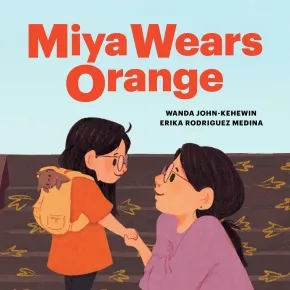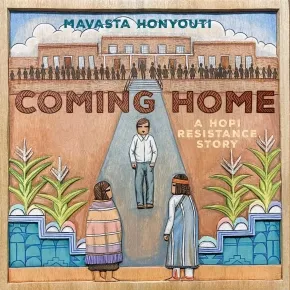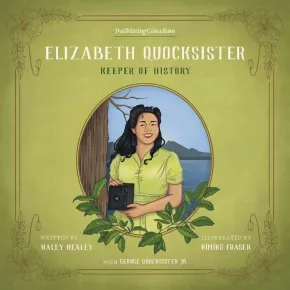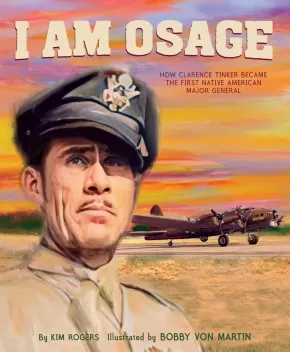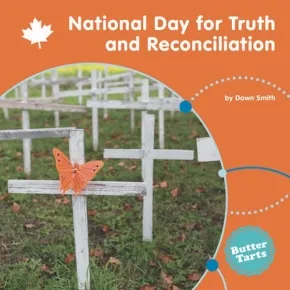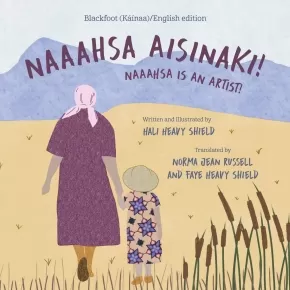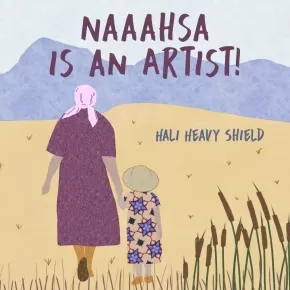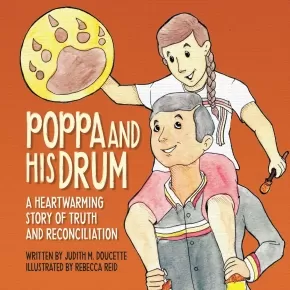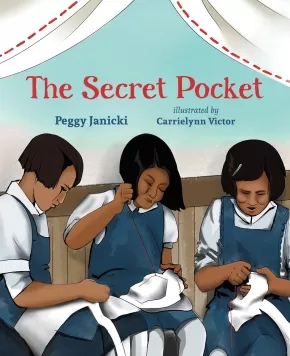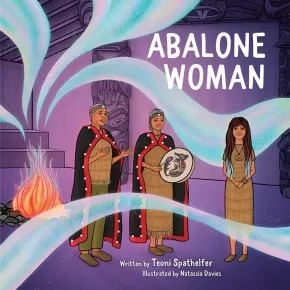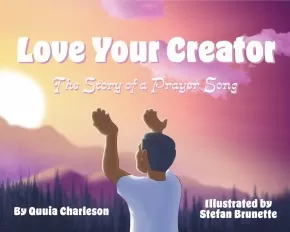
Ages 4 - 8
1
-
15
of
38 Results;
Sort By
Go To
of 3
Little Shoes
$24.99
Format:
Hardcover
Text Content Territories:
Indigenous Canadian; First Nations; Cree (Nehiyawak);
ISBN / Barcode: 9781774881729
Synopsis:
Synopsis:
From the bestselling and Governor General's Award–winning author of On the Trapline comes a beautifully told and comforting picture book about a boy's journey to overcome generational trauma of residential schools.
Deep in the night, when James should be sleeping, he tosses and turns. He thinks about big questions, like why we don't feel dizzy when the Earth spins. He looks at the stars outside his bedroom and thinks about the night sky stories his kōkom has told him. He imagines being a moshom himself. On nights like these, he follows the moonlit path to his mother's bedroom. They talk and they cuddle, and they fall asleep just like that.
One day, James's kōkom takes him on a special walk with a big group of people. It's called a march, and it ends in front of a big pile of things: teddy bears, flowers, tobacco ties and little shoes. Kōkom tells him that this is a memorial in honor of Indigenous children who had gone to residential schools and boarding schools but didn't come home. He learns that his kōkom was sent away to one of these schools with her sister, who also didn't come home.
That night, James can't sleep so he follows the moonlit path to his mother. She explains to James that at residential school when Kōkom felt alone, she had her sister to cuddle, just like they do. And James falls asleep gathered in his mother's arms.
Includes an author note discussing the inspiration for the book.
Reviews
"Robertson (Norway House Cree Nation) sensitively approaches this history, never explicitly describing the horrors of residential schools but instead leaving space for adults to grapple with youngsters’ questions in their own ways. Though he doesn’t provide easy answers, it’s clear that familial love keeps this child buoyed. Suffused with pinks, icy blues, and deep indigos, the glowing, cartoon-style digital illustrations from McKibbin (Ojibwe) depict the ancestral bonds that keep James rooted. Honest yet age-appropriate and deeply uplifting." —Kirkus Reviews
"Cree author Robertson reteams with Ojibwe, Yoeme, and Irish artist McKibbin (The Song That Called Them Home) for this work that honors children who did not return from residential schools. . . . James and his mother’s musing on intergenerational story-sharing further contribute to themes of connection and loss in this emotional work." —Publishers Weekly
"[Robertson and McKibbin] have taken on the weighty task of presenting a catastrophic loss to young readers, but also offering hope and determination. With poetic text and images of family life that are both familiar and mystical in tone, they have achieved this goal. . . . The honesty of Little Shoes is an antidote to fear." —Imaginary Elevators
"[A] big story about generational trauma of residential schools [which] focuses on the comfort that comes from family. Maya McKibbin evokes comfort and discomfort, as well as affection and thoughtfulness, with great sensitivity. . . . [A] great discussion starter for families and classes about residential schools, about Every Child Matters, and about asking questions. But it will also inspire understanding and empathy for that which has happened so that tragedies like residential schools are not repeated." —CanLit for Little Canadians
Educator Information
Recommended for ages 3 to 7.
This book is available in French: Petits souliers
Additional Information
48 pages | 8.00" x 12.00" | Hardcover
Miya Wears Orange
$21.95
Artists:
Format:
Hardcover
Text Content Territories:
Indigenous Canadian; First Nations; Cree (Nehiyawak);
ISBN / Barcode: 9781774921258
Synopsis:
Synopsis:
A beautifully illustrated book that gently explores the complicated feelings a young girl experiences as she learns about tragedy and injustice.
Miya loves her school and she especially loves storytime. One day, her teacher shares a story about a little girl who was taken away to a residential school. The little girl wasn’t allowed to go home. Her hair was cut and she wasn’t allowed to keep her favourite doll. She was taken away from her family because she was Indigenous, just like Miya!
Miya worries the same thing will happen to her. Her mom tells her that Indigenous girls and boys aren’t forced to leave their families anymore. Miya is relieved, but she is still sad. What can she do about these feelings?
Reviews
"A moving and important story that deftly explores the fear a little Indigenous girl feels when she learns the truth about residential schools. Miya finds solace in her mom’s words, and readers will too. A sensitive explanation of residential schools that prioritizes the emotional safety of all readers, especially Indigenous children."— Jen Moss, lecturer at UBC's School of Creative Writing
"opens the door to an important discussion about residential schools" - School Library Journal
Educator Information
Recommended for ages 6 to 8.
In this story, a young girl named Miya feels scared and sad after learning about residential schools, but she learns how to cope with the help of her mother.
A gentle story about big feelings and finding courage.
Big Ideas: Social-Emotional Learning: Emotions and Feelings; Social Justice: Intergenerational Trauma, Residential Schools.
This book is available in French: Le Chandail orange de Miya.
Additional Information
40 pages | 8.50" x 8.50" | Hardcover
Cedar School Decodables: Elder Jen’s Story
 $7.99
$7.99

Artists:
Format:
Paperback
Text Content Territories:
Indigenous Canadian; First Nations; Mi'kmaq (Mi'gmaq); Listuguj Mi'gmaq First Nation;
Grade Levels: Kindergarten; 1;
ISBN / Barcode: 9781771746540
Synopsis:
Synopsis:
In this story, it is the National Day for Truth and Reconciliation. Jen shares her story of healing with the students.
For a long time, Mi’gmaq were not allowed to speak their language at school. Today, many Mi’gmaq are reconnecting with their language.
How do you honour the National Day for Truth and Reconciliation?
Educator Information
Recommended for ages 4-7, for use in kindergarten and Grade 1 classrooms.
Cedar School Decodables is divided into six sets, which increase in word count and complexity of sentence structure. Elder Jen’s Story is in Set 6 – R-Controlled Vowels, and reviews er, ir, and ur. Books in Set 6 have 110-125 words.
Readers should be familiar with the concepts included in Set 1 to Set 6:
- consonants
- beginning and end blends
- short, long, and r-controlled vowels
- digraphs
- suffixes and ending spelling patterns
- a /o/
- s – /s/ and /z/
- VC-CV, V/CV, VC/V, and compound words
- possessives
This book is included in the Indigenous Books for Schools database from the Association of Book Publishers of BC. It is recommended for K to 2 classrooms for English Language Arts and Social Studies.
Series Information
Welcome to Cedar School! Join Liv, Tom, Gus, and Bell as they learn on the land and explore Mi’gmaw teachings with their teacher, Miss Sam, and the school’s Mi’gmaw Elder, Jen. With charming illustrations and simple storylines, this decodable series engages students as they practise their reading skills. Each book includes a pre-reading review of non-decodable words, and many of the books introduce special words related to Indigenous teachings. Talking Together prompts facilitate discussions led by the reading teacher.
Developed in partnership with Dyslexia Canada, Cedar School Decodables is a series of 20 decodable books for young readers. Designed for students who have previously learned short vowel and consonant sounds, additional phonic skills are developed progressively throughout the series.
The series will be accompanied by Cedar School Decodables Teacher’s Guide and a series of four picture books, which will be available at a later date.
Additional Information
16 pages | 6.5” x 5.5” | Paperback | ISBN: 9781771746540
Coming Home: A Hopi Resistance Story
$28.99
Artists:
Format:
Hardcover
ISBN / Barcode: 9781646144570
Synopsis:
Synopsis:
From master Hopi woodcarver Mavasta Honyouti, the story of his grandfather’s experience at a residential boarding school and how he returned home to pass their traditions down to future generations.
When Mavasta Honyouti was a boy he would go with his grandfather to their cornfield, watching him nurture every plant. During breaks, his grandfather would take out a piece of paako root and use his pocketknife to whittle away. He made beautiful carvings that Mavasta would later learn to do himself.
But Mavasta would often wonder: what was his kwa’a like when he was a boy? And one day, he heard the story.
Mavasta’s grandfather, like many Native American children across the country in the late 19th and early 20th century, was forced to leave his Hopi reservation as a child and go to a residential boarding school far away. There, the government cut his hair, punished him for speaking his native language, and gave him a new name. But Mavasta's grandfather never forgot who he was – or where he came from – and he tried to escape again and again. Finally, he made it back to their reservation.
In later years, Mavasta’s kwa’a chose a simple life, taking great care of his family just like he took great care of his plants. His son and later his grandson became acclaimed Hopi katsina woodcarvers, just like him. Coming Home: A Hopi Resistance Story is a deeply personal book – written in both English and Hopi – that features sixteen stunning original painted wood carvings. It is an unforgettable testament to one man rising above a painful piece of history to keep the light of his family and culture alive.
Educator Information
Recommended for ages 4 to 8.
Dual-language: English and Hopi.
Additional Information
48 pages | 9.00" x 9.20" | Hardcover
Elizabeth Quocksister: Keeper of History (PB)
$12.95
Artists:
Format:
Paperback
Text Content Territories:
Indigenous Canadian; First Nations; Kwakwaka'wakw (Kwakiutl); Da'naxda'xw Awaetlala;
ISBN / Barcode: 9781772034851
Synopsis:
Synopsis:
The uplifting true story of Elizabeth Quocksister, a strong Indigenous woman and community leader, who dedicated her life to protecting her language and cultural traditions.
Elizabeth Quocksister (1925–81) had many roles in her life. She was a cultural teacher, a community leader, a dancer, a nurse, a photographer, a residential school survivor, and a mother of ten. Born on the Da’naxda’xw Nation on Knight Inlet on the central coast of British Columbia, Elizabeth spoke fluent Kwak’wala and proudly celebrated her Kwakwaka’wakw culture at a time when the Canadian government actively discouraged Indigenous traditions and the speaking of Indigenous languages. She cared for community members in need and saved many children from the horrors of residential school. She chronicled the daily lives, important events, and changing times of her community through photography—preserving her people’s history and culture for future generations. This inspiring picture book is a beautiful tribute to a proud Indigenous woman whose name deserves to be well-known throughout her community and beyond.
Educator Information
Recommended for ages 4 to 8.
Additional Information
32 pages | 9.00" x 9.00" | Paperback
I Am Osage: How Clarence Tinker Became the First Native American Major General
$24.99
Artists:
Format:
Hardcover
Text Content Territories:
Indigenous American; Native American; Osage;
ISBN / Barcode: 9780063081161
Synopsis:
Synopsis:
This informative and inspiring picture book by acclaimed author Kim Rogers (Wichita), with striking artwork by debut illustrator Bobby Von Martin (Choctaw), celebrates the achievements of Clarence Tinker, a member of the Osage Nation who became the first Native American major general.
Clarence Tinker always knew that he wanted to do something extraordinary. Something adventurous. Something that made a difference in the world.
But as a member of the Osage Nation at the turn of the twentieth century, there were a lot of obstacles that he had to face to achieve his dreams. When he was a child, Clarence was taken away from his family and community. He was forced to attend a prisonlike boarding school, like many other Native children of his generation. There, he wasn’t able to speak his language or practice his Osage customs.
Still, Clarence kept his dream close to his heart and joined the US Army with the goal of becoming an officer. Though he was treading an unfamiliar path, he worked hard and never forgot his Osage values and traditions that, ultimately, paved his way to success.
I Am Osage, the first nonfiction project from the Heartdrum imprint, combines gorgeous, vibrant artwork with a stirring text that celebrates an unsung hero while also shedding light on significant American history.
Features an author’s note and timeline.
Educator Information
Recommended for ages 4 to 8.
Additional Information
40 pages | 9.00" x 11.00" | Hardcover
National Day for Truth and Reconciliation
$15.95
Format:
Paperback
Text Content Territories:
Indigenous Canadian; First Nations; Nuu-chah-nulth (Nootka);
ISBN / Barcode: 9781774564950
Synopsis:
Synopsis:
Readers are invited to jump into a canoe to learn about residential schools in Canada and the special day for truth and reconciliation. Author Dawn Sii-yaa-ilth-supt Smith is Nuu-chah-nulth and attended Tsartlip Indian Day School in British Columbia. She shares her story and the importance of truth-telling and reconciliation in Canada.
Educator & Series Information
Juvenile Nonfiction
This book is part of the Indigenous Communities in Canada series.
This book is available in French: La Journee nationale de la verite et de la reconciliation
Additional Information
24 Pages
Every Child Matters
$24.99
Format:
Hardcover
Text Content Territories:
Indigenous Canadian; First Nations; Inuit; Métis;
ISBN / Barcode: 9781778540165
Synopsis:
Synopsis:
Learn the meaning behind the phrase, ‘Every Child Matters.'
Orange Shirt Day founder, Phyllis Webstad, offers insights into this heartfelt movement.
Every Child Matters honours the history and resiliency of Indigenous Peoples on Turtle Island and moves us all forward on a path toward Truth and Reconciliation.
If you're a Residential School Survivor or an Intergenerational Survivor - you matter. For the children who didn't make it home - you matter. The child inside every one of us matters. Every Child Matters.
Reviews
"Every Child Matters speaks to all Indigenous Peoples - past and present - whose lives have been impacted by the residential school system. Phyllis and Karlene beautifully honour the unity, strength and resolve shared by Survivors, their families and their communities. Residential schools took our children and tried to break their vibrant spirits. With this book, the children of today can learn the truths of this history and how they can play a part in making sure every child matters." – Stephanie Scott, Executive Director of the National Center for Truth and Reconciliation
“…a brilliantly illustrated and meticulously written narrative. It is a must read.” - Chief Dr. Robert Joseph, Gwawaenuk, Elder, Reconciliation Canada
Educator Information
Recommended for ages 6 to 10.
Find the accompanying Teacher Lesson Plan resource HERE!
This book is available in French: Chaque enfant compte
Additional Information
44 pages | 8.50" x 11.00" | Hardcover
My Powerful Hair
$23.99
Artists:
Format:
Hardcover
Text Content Territories:
Indigenous American; Native American; Anishinaabeg; Ojibwe (Chippewa); Turtle Mountain Anishinaabe; Métis;
ISBN / Barcode: 9781419759437
Synopsis:
Synopsis:
From the award-winning and bestselling author of We Are Water Protectors comes an empowering picture book about family history, self-expression, and reclaiming your identity
Our ancestors say our hair is our memories,
our source of strength and power,
a celebration of our lives.
Mom never had long hair—she was told it was too wild. Grandma couldn’t have long hair—hers was taken from her. But one young girl can’t wait to grow her hair long: for herself, for her family, for her connection to her culture and the Earth, and to honor the strength and resilience of those who came before her.
From Carole Lindstrom, author of the New York Times bestseller and Caldecott Medal winner We Are Water Protectors, and debut illustrator Steph Littlebird comes an empowering and healing celebration of hair and its significance across Indigenous cultures.
Educator Information
Recommended for ages 4 to 8.
Additional Information
48 pages | 9.00" x 11.00" | Hardcover
Naaahsa Aisinaki! / Naaahsa is an Artist!
$21.95
Format:
Hardcover
Text Content Territories:
Indigenous Canadian; First Nations; Blackfoot Confederacy (Siksikaitsitapi); Kainai (Blood);
ISBN / Barcode: 9781772603477
Synopsis:
Synopsis:
Naaahsa says art is a language everyone understands. Sometimes we make art together. We draw, we bead, we sing. Sometimes Naaahsa tells stories in Blackfoot. I even get to go with her to see her art show at the National Gallery. Naaahsa is famous for her art, but I love her hugs best!
Naaahsa is an Artist! is a celebration of art, artists, and Indigenous women artists in particular. Each page comes to life with bold patterns, shapes, and Naaahsa's encouraging words that may inspire young readers to want to make art themselves.
Educator Information
Recommended for ages 6 to 8.
Dual-language edition in English and Blackfoot: Kainai Nation
Blackfoot translation by Norma Jean Russell and Faye Heavy Shield.
This book is available in English: Naaahsa is an Artist!
Additional Information
24 pages | 8.50" x 8.50" | Hardcover
Naaahsa Is an Artist!
$21.95
Format:
Hardcover
Text Content Territories:
Indigenous Canadian; First Nations; Blackfoot Confederacy (Siksikaitsitapi); Kainai (Blood);
ISBN / Barcode: 9781772603460
Synopsis:
Synopsis:
Naaahsa says art is a language everyone understands. Sometimes we make art together. We draw, we bead, we sing. Sometimes Naaahsa tells stories in Blackfoot. I even get to go with her to see her art show at the National Gallery. Naaahsa is famous for her art, but I love her hugs best!
Naaahsa is an Artist! is a celebration of art, artists, and Indigenous women artists in particular. Each page comes to life with bold patterns, shapes, and Naaahsa's encouraging words that may inspire young readers to want to make art themselves.
Reviews
“What a marvelous and sparkling read. How blessed are we to have Naaahsa’s wisdom for how inspiration is everywhere and, if you welcome and embrace it, the magic of the world is yours to celebrate your way in any way you wish. Thank you, Hali Heavy Shield, for sharing Naaahsa’s warmth and love. Every page feels like a hug from home.” — Richard Van Camp, author of Little You and We Sang You Home
“This book is sure to be a hit. As seen through the eyes of a grandchild, Naaahsa is an Artist! conveys the healing power of art and the importance of taking up space in institutions that have not welcomed Indigenous Peoples in the past.” — Nancy Cooper, First Nations Consultant for the Southern Ontario Library Services and coordinator for First Nation
“I love the grandmother/granddaughter relationship here and I love how proud the little girl is of her grandma. It’s a book I can relate to as I had a close relationship with my grandmother.” — Jodie Callaghan, author of Ga’s/The Train
Educator Information
Recommended for ages 6 to 8.
This book is available in a dual-language format: Naaahsa Aisinaki! / Naaahsa is an Artist!
Additional Information
24 pages | 8.50" x 8.50" | Hardcover
Poppa and His Drum
$16.95
Artists:
Format:
Paperback
Text Content Territories:
Indigenous Canadian; First Nations; Mi'kmaq;
ISBN / Barcode: 9781774571262
Synopsis:
Synopsis:
After moving from an all-French Indigenous community to the English community of St. George's when he was a little boy, Poppa's life as a young man was very sad. He was treated badly by his schoolteachers and some other children in the town.
Years later, when his grandson wants to bring him into school to play his drum for the class, Poppa is nervous but goes anyway. He is relieved to see he is welcomed and even encouraged to share his knowledge of the traditions and customs of his Mi'kmaw culture.
Thankfully, times have changed from Poppa's generation, and he is pleased to have reconciled with the bad experiences he had when he went to school. Indeed, there is strength and wisdom in Reconciliation!
Educator & Series Information
Recommended for ages 5 to 12.
This is the first book in the Poppa series.
Additional Information
36 pages | 9.00" x 9.00" | Paperback
The Secret Pocket
$21.95
Artists:
Format:
Hardcover
Text Content Territories:
Indigenous Canadian; First Nations; Dene; Dakelh (Carrier);
ISBN / Barcode: 9781459833722
Synopsis:
Synopsis:
The true story of how Indigenous girls at a Canadian residential school sewed secret pockets into their dresses to hide food and survive
Mary was four years old when she was first taken away to the Lejac Indian Residential School. It was far away from her home and family. Always hungry and cold, there was little comfort for young Mary. Speaking Dakelh was forbidden and the nuns and priest were always watching, ready to punish. Mary and the other girls had a genius idea: drawing on the knowledge from their mothers, aunts and grandmothers who were all master sewers, the girls would sew hidden pockets in their clothes to hide food. They secretly gathered materials and sewed at nighttime, then used their pockets to hide apples, carrots and pieces of bread to share with the younger girls.
Based on the author's mother's experience at residential school, The Secret Pocket is a story of survival and resilience in the face of genocide and cruelty. But it's also a celebration of quiet resistance to the injustice of residential schools and how the sewing skills passed down through generations of Indigenous women gave these girls a future, stitch by stitch.
Awards
- 2023 Sunshine Coast Writers and Editors Society (SCWES) Book Awards for BC Authors joint winner
- 2024 Forest of Reading Silver Birch Express Award
Reviews
“In bringing her mother’s story to the world, Peggy Janicki has ignited a powerful fire for intergenerational healing. A vivid illustration of how Traditional Knowledge helped the children at residential schools be heroes for themselves and each other. Not only has Janicki meticulously documented everyday life as experienced by the students of the Lejac residential school but she has also highlighted their ingenious and courageous efforts to survive. Strengths-based, age-appropriate and vividly engaging.”— Christy Jordan-Fenton, award-winning author of Fatty Legs
“Beautifully illustrated and powerfully narrated, The Secret Pocket amplifies the voices and experiences of Indian Residential School Survivors. In doing so, Peggy Janicki and Carrielynn Victor make an important contribution to the work of putting truth before reconciliation.”— Sean Carleton, historian and author of Lessons in Legitimacy: Colonialism, Capitalism, and the Rise of State Schooling in British Columbia
“In this important story of courage and resistance, educator Peggy Janicki shares the story of her mother and other Survivors who sewed secret pockets into their dresses to hide food to feed themselves and others at Lejac residential school. We need to continue to hear these stories and share them with our children so we can move forward in our collective healing.”— Dr. Sara Florence Davidson, co-author of Potlach as Pedagogy: Learning Through Ceremony
“It is through stories that knowledge, understanding, empathy and the tools for deep and lasting change are passed on. Peggy Janicki has carried her mother’s story for us to hold in our hearts. This truth-telling and history-sharing will touch readers of all ages as they allow themselves to feel the weight of this powerful book.”— Amber Price, MGC, owner of The Book Man
Educator Information
Recommended for ages 6 to 8.
This book is available in French: La poche secrète.
Additional Information
32 pages | 8.75" x 10.75" | Hardcover
Abalone Woman (PB)
$12.95
Artists:
Format:
Paperback
Text Content Territories:
Indigenous Canadian; First Nations; Heiltsuk (Bella Bella);
ISBN / Barcode: 9781772034271
Synopsis:
Synopsis:
A vivid dream teaches Little Wolf about courage and acceptance of those who are different, and inspires her to show her daughters and their classmates how to be proud of their diverse cultural backgrounds.
Throughout her life, Little Wolf has been troubled by the injustice she sees all around her. When she was young, she was bullied for her Indigenous heritage. Her mother, White Raven, spent ten years in a residential school, separated from her family and isolated from her culture. Little Wolf’s own children are growing up in a different, more open society, but hatred and racism still exist. Little Wolf worries about the world her daughters will inherit. One night, a vivid dream helps her realize her own strength as a leader and peacemaker in her community. Told with powerful imagery and symbolism, Abalone Woman is the third book in the Little Wolf series, which presents themes of racism, trauma, and family unity through relatable, age-appropriate narratives.
Educator & Series Information
Recommended for ages 4 to 8.
This is the third book in the Little Wolf series.
This book is available in French: Femme Ormeau
Additional Information
32 pages | 9.00" x 9.00" | Paperback
Love Your Creator: The Story of a Prayer Song
$20.95
Artists:
Format:
Paperback
Text Content Territories:
Indigenous Canadian; First Nations; Nuu-chah-nulth (Nootka); Hesquiaht;
ISBN / Barcode: 9781777894726
Synopsis:
Synopsis:
This is the true story behind a song that was once a hymn remembered from residential school. With the help of his family and community, especially the determination of his son, and encouraging words of his Grandmother, Knowledge Keeper Quuia Charleson (Nuu-Chah-Nulth), has reclaimed Love Your Creator and continues to share both the song and its story through oral tradition at events and on travels. Engaging illustrations by Stefan Brunette passionately portray the people and events in this exciting picture book for all ages. Discover the story and learn the strength of a song.
Educator Information
Recommended for ages 5 to 12.
This book is available in French: Aime ton Créateur: L'histoire d'une chanson de prière.
Additional Information
36 pages | 10.00" x 8.00" | Paperback
Sort By
Go To
of 3




